How a 15 minute school lunch still affects one Olympia man
Jun 6, 2019, 4:36 PM | Updated: 4:40 pm
Yesterday, I presented a story about how a lot of kids in Washington state have a very short school lunch period and don’t have time to finish eating. But what’s the long lasting effect of elementary school students only having 15 minutes to eat?
Meet Tim Ascher and Jessica Arena, a married couple from Olympia.
“I think it was the first time we ate,” Jessica said. “I noticed that he ate the food so quickly I thought he had some weird joke that I didn’t understand. He kind of lowered his whole body over the plate and just inhaled the food. In probably eight or nine minutes, he was done and I’d had maybe four bites. We’d only been dating for so long so I tried to chat with him, but he wasn’t talking. He was a man who was focused on a mission and that mission was to eat these chicken tenders — quickly.”
About a month later, after a few more meals, Jessica finally got up the nerve to ask Tim why he ate so quickly. He said it was a bad habit he developed from trying to eat as much as he could during short grade school lunches.
A food truck by veterans, for veterans
Inside the new menu at T-Mobile Park
“From grades one through five we had lunch at 11:30,” Tim said. “It started at 11:30 and it ended at 11:45. You had 15 minutes to get your lunch, get in line to get hot lunch or to pick up your sack lunch, find a seat, eat your lunch and take the refuse to the garbage and also to get out on the playground. Fifteen minutes to do all of that.”
So Ascher would put his head down and eat as if his life depended on it. Even then, he says he didn’t finish everything.
“They were very strict about it,” he said. “They had lunchroom monitors to get us out on the playground at 11:45 sharp, no exceptions. If you were still seated and eating, they would badger you, and badger you to get done, throw it away, lots of wasted food, and get out on the playground.”
Over the years, Tim has tried to change the eating habit that began in grade school.
“I do, I’ve tried various methods,” he said. “The most successful, even if it’s cumbersome, is I get up and leave the table and then come back and eat. I don’t do that if I’m out at a restaurant but at home, yes, and if the food gets cold there is always a microwave.”
Jessica doesn’t know how effective Tim’s method is. She says he eats just as fast, but in shifts.
Jessica and Tim are expecting their first child at the end of the summer and she’s concerned about their son picking up her husband’s eating style.
“I’m a little worried,” she said. “I think our child might find it a little awkward or strange when he goes to somebody else’s house for dinner and the dad doesn’t get up halfway through the meal to read a book like Tim does. He’s kind of broken it up into three sections: I start to eat, he’ll join me after five minutes. He’ll eat for about five minutes and then he takes a breather and sits and reads or watches TV and then he comes back, eats a little more, sometimes he pauses and he might come back for one more round.”
Giving kids more time to eat lunch at school is bigger than just nutrition. It’s teaching kids that it’s healthy to take a break from working, step away from the desk, slow down and thoroughly enjoy a meal.
Kids don’t have enough time to eat lunch. Can Washington fix that?
“The socialization in elementary school, especially, is critical,” Tim said. “So that aspect of lunch, actually being able to converse.”
A lot of parents think their kids aren’t finishing their lunch because they’re spending the whole lunch break socializing. They don’t believe them when they say there isn’t enough time to finish eating.
“Take your children seriously when they are reporting things that are happening in school,” Tim said. “Maybe it isn’t horrible or really unnerving but just seems odd and not the best. Take them seriously and don’t dismiss them because it could have wider repercussions.”














